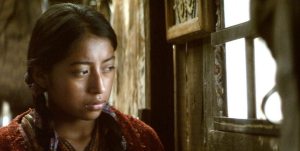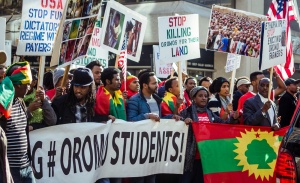Quipu — calls for justice
‘Esperanza and Teodula were sterilised without consent more than 18 years ago. They are still searching for justice in Quipu, Peru.’
University of Bristol research has inspired a short documentary produced by The Guardian in which Peruvian women, sterilised against their will in the 1990s, share personal testimonials with a global audience.
Cenotes resguardan secretos de los mayas
El arquéologo mexicano Guillermo de Anda visitó Costa Rica para compartir su experiencia como explorador subacuático en las cavernas inundadas de la península de Yucatán
Bajo la superficie de la península de Yucatán, en México, se oculta un invaluable tesoro geológico, biológico y cultural en unas laberínticas cavernas inundadas de agua dulce llamadas cenotes.
Guillermo de Anda es arqueólogo subacuático y acumula tres décadas de experiencia en exploración de estos enigmáticos depósitos de agua. Desde hace seis años, De Anda forma parte del equipo de exploradores de National Geographic .
Indigenous Victory: A Spanish hydroelectric company abandons project in Guatemala after indigenous resistance
After years of protests by indigenous communities, the Spanish company Ecoener-Hidralia has finally abandoned the project to build a hydroelectric dam on the Cambalan indigenous river, in Guatemala. The company has informed this decision through a statement published in the media of the Central American country.
The company had already paralyzed the work it was doing on the San Juan de Barillas indigenous territory months ago, and had dropped charges against leaders of the community that had been denounced and imprisoned for rejecting the project and protesting against it. However, it hadn’t officially renounced to build it. Now, the company has stated that the project “hasn’t earned acceptance by a significant number of inhabitants of the territory where it was intended to be located.”
Indigenous Weavers in Guatemala Mobilize to Defend Their Craft and Cultural Rights
Indigenous weavers in Guatemala are challenging the appropriation of their identities by both national and transnational companies. On November 24, hundreds of indigenous weavers from across the country made the journey to Guatemala City to present congress with a series of reforms that would lead to the legal protection of their intellectual property rights as weavers.
“We came here to present this proposal so that our weavings will be respected,” said Floratina, a 81-year-old indigenous Kaqchikel weaver from the community of Santo Domingo Xenacoj. She has woven for 70 years of her life. “We are struggling so that our craft does not end. We demand that our works are not taken to other countries to make money, and also that other countries do not come to take away our [weavings], as they always have had the custom of coming; and they continue to come, they do not stop. Now there are machines coming from China and Taiwan to make our weavings. We ask that the authorities respect our identity.”
Las mujeres indígenas de México enfrentan situaciones de pobreza, analfabetismo y falta de acceso a los servicios de salud
CIUDAD DE MÉXICO- Para fomentar la cultura de la autoexploración en mujeres de las comunidades indígenas, la Fundación Mamas Sanas diseñó el primer material informativo y preventivo sobre cáncer de mama en lengua maya, náhuatl y otomí.
Tras enfrentar este padecimiento hace 14 años y haberse sometido a la extirpación de la mama, Guadalupe Mayorga Malabehar entendió que los conocimientos actuales sobre las causas y la autoexploración del cáncer de mama son todavía insuficientes.
Standing Rock Joins the World’s Indigenous Fighting for Land and Life
When opposition to the Dakota Access pipeline galvanized the support of hundreds of U.S. tribes, it became an unprecedented show of Indian Country unity and resolve.
Now, it’s a global indigenous movement.
Members of tribal communities from around the world have joined in activism led by the Standing Rock Sioux Tribe. A Sami group from Norway was the latest to arrive on Friday. This resistance campaign, many say, has emerged as part of a greater global crisis—a united struggle in which indigenous lands, resources, and people are perpetually threatened by corporations and governments often using military force. Integral to this shared narrative is the routine ignoring of treaties.
Ixcanul, a Mayan-language film by director Jayro Bustamante, has become a bonafide hit in Guatemala. The movie is currently in the midst of its third theatrical run. Its star, María Mercedes Coroy, has scored a campaign with Pepsi, and was recently featured on the cover of a fashion magazine. She is the first indigenous woman in Guatemala to claim that honor.
The overwhelmingly positive reception of Ixcanul is surprising, because Guatemala’s indigenous people exist on the margins of society. Bustamante told The Huffington Post that he heard audience members laugh at the Mayan dialect spoken by the film’s characters. “The racism in Guatemala is very crude and very strong,” he said. “[People] feel the language is part of the past and not part of the progress we have made in the country.”
The day Vinicio Nicolas found out whether he would be allowed to stay in the United States, and hopefully far from the gang trying to recruit him in Guatemala, he brought along an interpreter.
With the stakes so high, he wanted someone who spoke his native tongue. He had arrived in the U.S. just eight months before, and his English wasn’t good. But neither was his Spanish.
The language the 15-year-old needed an interpreter to wrestle with — for the sake of his future — was an ancient Mayan one called Q’anjob’al, or Kanjobal.
Successive waves in recent years of more than 100,000 immigrants from Central America — many of them boys and girls who came without their parents — have created a shortage of people who can translate Mayan languages, especially K’iché (Quiché) and Mam. This is an especially acute need for arrivals from Guatemala, which is home to more than two dozen indigenous languages, but also from countries such as Honduras.
Human Rights of Ethiopia’s Oromo People Brought to Light in Rio
On August 21st, in Brazil, Ethiopian runner Feyisa Lilesa was awarded the silver medal for the Men’s Marathon in the 2016 Rio Olympics. Although this was perhaps one of the greatest sporting achievements of his life, this day will forever be remembered for the political protest he made just before the finish line. While in the global spotlight, Lilesa raised his hands above his head in an ‘X’ formation to stand in solidarity with the Oromo people of Ethiopia, who have suffered a crackdown at the hands of the Ethiopian government.
Lilesa is one of the thousands fighting for the rights of the Oromo people. In August 2016, the United Nations High Commissioner for Human Rights, Zeid Raad Al Hussein, called on Ethiopia to allow UN international observers to investigate the excessive use of force by the government’s security forces against peaceful protesters in the Oromo and Amhara regions of the country. There is a strong need for organized international pressure on the Ethiopian government. A credible and independent investigation into this country’s Human Rights offences is long overdue. This will be a huge and very welcome step for the people and the country as a whole.
Honduran Indigenous Activist Wins Human Rights Award for Struggle Against Corporate Destruction of Land
On June 9, Ana Mirian Romero, a 29-year-old indigenous Lenca woman and mother of five from the department of La Paz, Honduras, was recognized by the European human rights organization Front Line Defenders in a ceremony in Dublin, Ireland. Romero was awarded the organization’s annual award for Human Rights Defenders for her work struggling for the recognition of indigenous lands and against the corporate destruction of the environment in Honduras.
“Our struggle is going to continue,” said Romero in a Skype interview from Dublin. “With this prize, it is something that gives us more force, and something that reinforces our struggle; it gives us more value to continue.”










